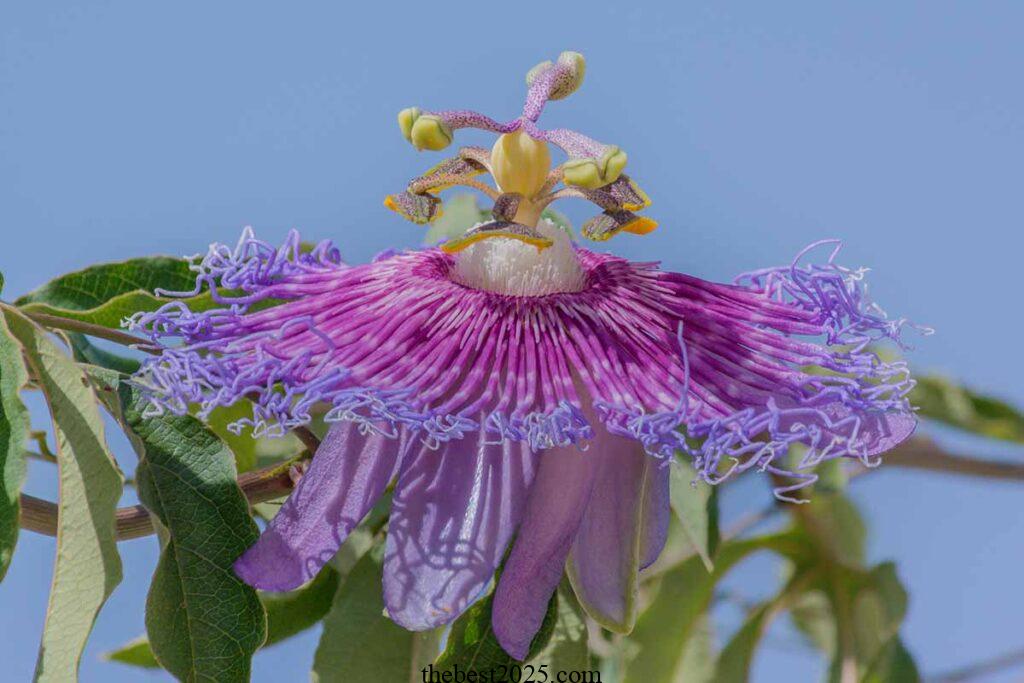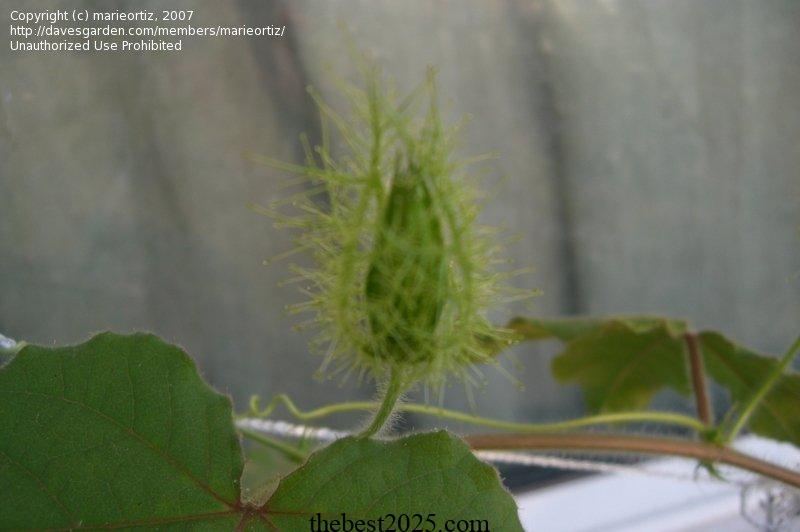17 of the Best Passionflower Species and Hybrids to Grow at
Home
Passionflowers, with their captivating beauty and
diverse range of species and hybrids, have earned a special place in the
hearts of gardening enthusiasts worldwide. These remarkable vines and shrubs
not only showcase stunning, intricate blooms but also offer a host of
potential benefits to your garden and well-being. In this comprehensive guide,
we’ll introduce you to 17 of the best passionflower species and hybrids to
cultivate at home, so you can create a captivating garden sanctuary like no
other.
1. Passiflora incarnata
(Maypop)

Passiflora
incarnata, commonly known as the Maypop, is a North American native
passionflower that’s celebrated for its hardiness and vibrant blooms. Its
unique name, “Maypop,” reflects the sound produced when you step on the
plant’s hollow stems. These delightful vines are adorned with striking purple
and white flowers and can withstand various climatic
conditions.
Gardening enthusiasts appreciate the Maypop not
only for its aesthetic appeal but also for its potential calming effects. Some
believe that this passionflower may help alleviate stress and anxiety, making
it an ideal choice for your garden retreat.
2.
Passiflora caerulea (Blue
Passionflower)

The
Passiflora caerulea, also known as the Blue Passionflower, is
a favorite among gardeners due to its stunning blue and white blooms and rapid
growth. This passionflower species, originating from South America, is highly
adaptable and can thrive in a wide range of climates.
Beyond
its ornamental beauty, the Blue Passionflower is known for its potential
medicinal properties. Traditional herbal medicine practitioners have used it
to address various ailments, including insomnia and anxiety. Having this vine
in your garden not only adds charm but also potentially aids in promoting
well-being.
3. Passiflora edulis (Passion
Fruit)

Passiflora
edulis, commonly referred to as Passion Fruit, is a renowned fruit-
bearing passionflower species that entices gardeners with its delicious and
exotic fruits. While the stunning, fragrant flowers are a treat for the eyes,
it’s the sweet, tangy fruit that steals the show.
Growing
Passion Fruit at home allows you to enjoy the benefits of these delectable
fruits and adds a touch of tropical elegance to your garden. The vine’s fruit
is not only a culinary delight but also a source of essential nutrients,
making it a cherished choice for passionate gardeners.
4.
Passiflora alata (Winged-Stem
Passionflower)

The
Passiflora alata, or Winged-Stem Passionflower, is a
captivating species that gets its name from the distinctive wing-like
appendages on its stems. Native to Brazil, this passionflower species boasts
mesmerizing, red and white blooms that add a touch of exotic allure to your
garden.
In addition to its visual appeal, the Winged-Stem
Passionflower has potential healing properties. Traditional medicine has
explored its use for conditions such as sleep disorders and anxiety, making it
a valuable addition to your garden sanctuary.
5.
Passiflora ligularis (Sweet
Granadilla)

The
Passiflora ligularis, commonly known as the Sweet Granadilla,
is another fruit-bearing passionflower that combines aesthetic beauty with
delectable fruits. Native to South America, this species features fragrant,
showy flowers and offers a delightful surprise in the form of sweet, juicy
fruits.
Cultivating Sweet Granadilla at home allows you to
savor the exquisite taste of its fruits and contribute to biodiversity in your
garden. These passionflowers serve as a valuable food source for pollinators
and wildlife, enhancing the ecological balance of your outdoor
haven.
6. Passiflora racemosa (Red
Granadilla)
The Passiflora racemosa, or
Red Granadilla, is a close relative of the Sweet Granadilla, sharing its
appeal for both gardeners and nature enthusiasts. This passionflower species,
native to Central America, exhibits charming, red and white flowers and
produces delectable, red-skinned fruits.
Growing Red Granadilla
in your garden not only provides visual delight but also attracts pollinators,
making it a wonderful choice for those seeking to support local
ecosystems.
7. Passiflora vitifolia (Perfumed
Passionflower)
The Passiflora
vitifolia, also known as the Perfumed Passionflower, is cherished for
its stunning red and white blooms that exude a sweet, enticing fragrance.
Native to South America, this species adds an air of romance to any garden
setting.
In addition to its aromatic allure, the Perfumed
Passionflower is believed to have potential medicinal properties, including
aiding in relaxation and promoting restful sleep. This makes it an enchanting
choice for creating a peaceful oasis in your outdoor space.
8.
Passiflora ‘Lavender Lady’ (Lavender Lady
Passionflower)
The Passiflora ‘Lavender
Lady’, or Lavender Lady Passionflower, is a hybrid cultivar renowned
for its mesmerizing lavender-colored blooms. This passionflower hybrid is a
product of careful breeding, resulting in a visually stunning addition to your
garden.
Aside from its aesthetic appeal, the Lavender Lady
Passionflower is believed to have potential calming effects, making it a
valuable asset for your garden sanctuary.
9. Passiflora
‘Lady Margaret’ (Lady Margaret Passionflower)
The
Passiflora ‘Lady Margaret’, or Lady Margaret Passionflower, is
another captivating hybrid cultivar known for its striking red and white
blossoms. This passionflower hybrid is a true showstopper, adding a dash of
elegance to your garden landscape.
In addition to its visual
allure, the Lady Margaret Passionflower is believed to have potential
therapeutic properties, contributing to a sense of tranquility and well-being
in your garden retreat.
10. Passiflora ‘Amethyst’
(Amethyst Passionflower)
The Passiflora
‘Amethyst’, or Amethyst Passionflower, is a hybrid cultivar that
showcases breathtaking, amethyst-colored blooms. Its unique coloration sets it
apart, making it a standout choice for those who seek to create a garden
that’s truly extraordinary.
This passionflower hybrid’s
mesmerizing beauty is complemented by its potential calming effects, making it
an enchanting addition to your garden sanctuary.
11.
Passiflora ‘Incense’ (Incense
Passionflower)
The Passiflora
‘Incense’, or Incense Passionflower, is a hybrid cultivar known for
its delicate and fragrant blooms. This passionflower hybrid adds an extra
layer of sensory delight to your garden with its exquisite flowers and subtle,
incense-like fragrance.
In addition to its aromatic appeal, the
Incense Passionflower is believed to have potential relaxation-inducing
properties, enhancing the ambiance of your garden space.
12.
Passiflora quadrangularis (Giant
Granadilla)
The Passiflora
quadrangularis, or Giant Granadilla, is a species celebrated for its
impressive size and equally impressive fruits. Native to tropical America,
this passionflower species boasts enormous, showy flowers and oversized,
greenish-yellow fruits.
Growing Giant Granadilla at home allows
you to create a focal point in your garden with its large, attention-grabbing
presence. The sizable fruits, which can weigh up to several pounds, are not
only a visual spectacle but also a source of refreshment, often enjoyed in
various culinary creations.
13. Passiflora coccinea
(Red Passionflower)
The Passiflora
coccinea, or Red Passionflower, is a charming species known for its
vibrant red and green blooms. Originating from South America, this
passionflower species adds a dash of color and energy to your
garden.
Beyond its ornamental appeal, the Red Passionflower is
believed to have potential calming effects, contributing to a soothing
atmosphere in your garden retreat.
14. Passiflora
‘Constance Eliott’ (Constance Eliott Passionflower)
The
Passiflora ‘Constance Eliott’, or Constance Eliott
Passionflower, is a hybrid cultivar celebrated for its delicate and pure white
blossoms. This passionflower hybrid’s elegant and pristine appearance makes it
a timeless choice for garden enthusiasts.
In addition to its
visual charm, the Constance Eliott Passionflower is believed to have potential
therapeutic properties, making it a valuable addition to your garden
sanctuary.
15. Passiflora ‘Purple Haze’ (Purple Haze
Passionflower)
The Passiflora ‘Purple
Haze’, or Purple Haze Passionflower, is a hybrid cultivar
distinguished by its stunning purple blooms with vibrant white centers. This
passionflower hybrid’s mesmerizing coloration adds a sense of mystique to your
garden landscape.
Aside from its aesthetic allure, the Purple
Haze Passionflower is believed to have potential calming effects, contributing
to a peaceful ambiance in your outdoor space.
16.
Passiflora ‘Clear Sky’ (Clear Sky
Passionflower)
The Passiflora ‘Clear
Sky’, or Clear Sky Passionflower, is a hybrid cultivar known for its
enchanting, light blue blossoms. This passionflower hybrid’s serene coloration
brings a sense of serenity to your garden.
In addition to its
visual appeal, the Clear Sky Passionflower is believed to have potential
relaxation-inducing properties, enhancing the tranquility of your garden
retreat.
17. Passiflora ‘Lavender Lace’ (Lavender Lace
Passionflower)
The Passiflora ‘Lavender
Lace’, or Lavender Lace Passionflower, is a hybrid cultivar cherished
for its delicate lavender blooms with intricate, lace-like patterns. This
passionflower hybrid’s elegant appearance adds a touch of sophistication to
your garden.
In addition to its ornamental charm, the Lavender
Lace Passionflower is believed to have potential therapeutic properties,
contributing to a sense of well-being and refinement in your garden
sanctuary.
FAQ: Frequently Asked
Questions
- How do I care for
passionflowers at home? Passionflowers thrive in well-drained soil and
require full sunlight. Regular pruning and support for climbing varieties are
essential for optimal growth. Water them consistently, but avoid
overwatering.
- Can I grow
passionflowers from seeds? Yes, you can grow passionflowers from
seeds, but it may take a bit longer to see blooms. It’s often easier to start
with young plants or cuttings.
- Are
passionflowers easy to maintain? Passionflowers are relatively low-
maintenance but may require some attention, particularly when it comes to
pruning and training climbing varieties. They are generally hardy and
adaptable.
- What are the potential
medicinal benefits of passionflowers? Passionflowers have been
traditionally used to address various conditions such as anxiety, insomnia,
and stress. While more research is needed, some believe in their potential
calming and therapeutic effects.
- What
animals are attracted to passionflowers? Passionflowers are popular
among pollinators, including bees and butterflies. Some species may also
attract birds, which feed on the fruits.
- Can I grow passionflowers in containers? Yes,
many passionflower varieties can be grown in containers, making them a
suitable choice for limited garden space.
- Do passionflowers require any specific care during the
winter months? Passionflowers may need protection from frost and cold
temperatures. Consider covering them or moving potted plants indoors during
winter.
- How long does it take for
passionflowers to bloom? The time it takes for passionflowers to bloom
varies depending on the species and growing conditions. Some may bloom in
their first year, while others may take longer.
- Do passionflowers have any specific pests or diseases
to watch out for? Passionflowers can be susceptible to aphids, spider
mites, and certain fungal diseases. Regular inspection and appropriate
treatment can help prevent and address these issues.
In
conclusion, cultivating passionflowers at home offers not only a visual
spectacle but also the potential for a more tranquil and vibrant garden space.
Whether you’re drawn to the stunning blooms, the delectable fruits, or the
possible therapeutic benefits, these 17 passionflower species and hybrids
provide a wide array of options to elevate your gardening experience. Embrace
the allure of passionflowers and create a garden sanctuary like no
other.
tag
- chicken feed
- how to
Keep Chickens Off Your Porch - How to grow oyster
mushrooms at home - Growing Kale in Pots


0 Comments